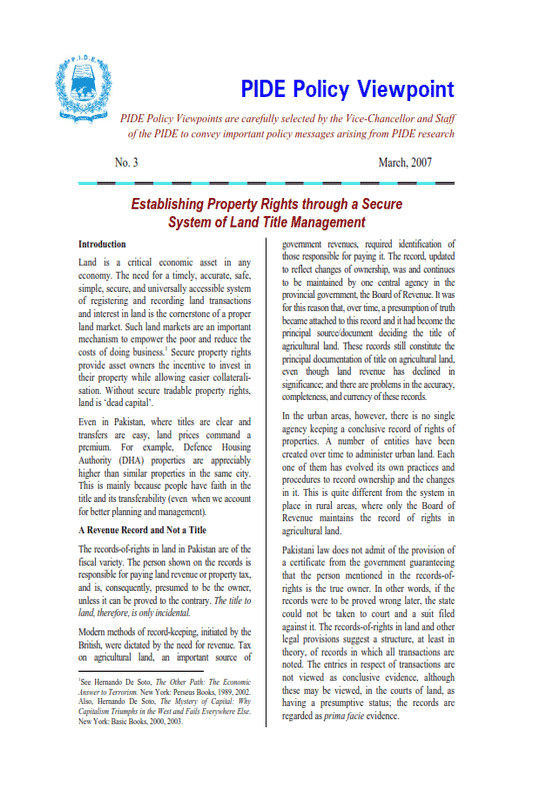Establishing Property Rights Through A Secure System Of Land Title Management (English)
Establishing Property Rights Through A Secure System Of Land Title Management Introduction Land Is A Critical Economic Asset In Any Economy. The Need For A Timely, Accurate, Safe, Simple, Secure, And Universally Accessible System Of Registering And Recording Land Transactions And Interest In Land Is The Cornerstone Of A Proper Land Market. Such Land Markets Are An Important Mechanism To Empower The Poor And Reduce The Costs Of Doing Business.1 Secure Property Rights Provide Asset Owners The Incentive To Invest In Their Property While Allowing Easier Collaterali Sation. Without Secure Tradable Property Rights, Land Is ‘Dead Capital’. Even In Pakistan, Where Titles Are Clear And Transfers Are Easy, Land Prices Command A Premium. For Example, Defence Housing Authority (Dha) Properties Are Appreciably Higher Than Similar Properties In The Same City. This Is Mainly Because People Have Faith In The Title And Its Transferability (Even When We Account For Better Planning And Management). A Revenue Record And Not A Title The Records-Of-Rights In Land In Pakistan Are Of The Fiscal Variety. The Person Shown On The Records Is Responsible For Paying Land Revenue Or Property Tax, And Is, Consequently, Presumed To Be The Owner, Unless It Can Be Proved To The Contrary. The Title To Land, Therefore, Is Only Incidental. Modern Methods Of Record-Keeping, Initiated By The British, Were Dictated By The Need For Revenue. Tax On Agricultural Land, An Important Source Of 1see Hernando De Soto, The Other Path: The Economic Answer To Terrorism. New York: Perseus Books, 1989, 2002. Also, Hernando De Soto, The Mystery Of Capital: Why Capitalism Triumphs In The West And Fails Everywhere Else. New York: Basic Books, 2000, 2003. Government Revenues, Required Identification Of Those Responsible For Paying It. The Record, Updated To Reflect Changes Of Ownership, Was And Continues To Be Maintained By One Central Agency In The Provincial Government, The Board Of Revenue. It Was For This Reason That, Over Time, A Presumption Of Truth Became Attached To This Record And It Had Become The Principal Source/Document Deciding The Title Of Agricultural Land. These Records Still Constitute The Principal Documentation Of Title On Agricultural Land, Even Though Land Revenue Has Declined In Significance; And There Are Problems In The Accuracy, Completeness, And Currency Of These Records. In The Urban Areas, However, There Is No Single Agency Keeping A Conclusive Record Of Rights Of Properties. A Number Of Entities Have Been Created Over Time To Administer Urban Land. Each One Of Them Has Evolved Its Own Practices And Procedures To Record Ownership And The Changes In It. This Is Quite Different From The System In Place In Rural Areas, Where Only The Board Of Revenue Maintains The Record Of Rights In Agricultural Land. Pakistani Law Does Not Admit Of The Provision Of A Certificate From The Government Guaranteeing That The Person Mentioned In The Records-Of Rights Is The True Owner. In Other Words, If The Records Were To Be Proved Wrong Later, The State Could Not Be Taken To Court And A Suit Filed Against It. The Records-Of-Rights In Land And Other Legal Provisions Suggest A Structure, At Least In Theory, Of Records In Which All Transactions Are Noted. The Entries In Respect Of Transactions Are Not Viewed As Conclusive Evidence, Although These May Be Viewed, In The Courts Of Land, As Having A Presumptive Status; The Records Are Regarded As Prima Facie Evidence.




